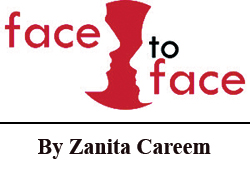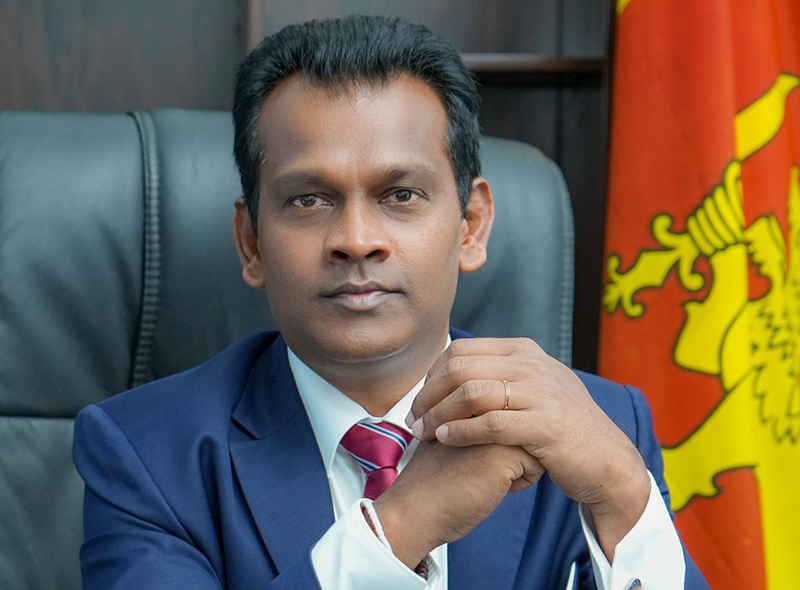Life style
Koreans who visit Sri Lanka don’t want to leave says Ambassador Miyon Lee

Ambassador of the Republic of Korea in Sri Lanka Miyon Lee shares her story on how determination, hard work and a sense of duty for her country helped her achieve her goals . Throughout her illustrious career. Ambassador Miyon, has been a steadfast advocate for peace, pushing for stronger economic and cultural ties between countries she serves facilitating diplomacy.
Affable,charming and proud to be in Sri Lanka, she is dedicated to strengthening the diplomatic relationship between Sri Lanka and South Korea focusing on enhancing cooperation in trade,commerce and culture.
She brings a common touch to each interaction,expressing an genuine interest in each person she spoke about the shared values between Sri Lanka and South Korea
Her first impression of Sri Lanka is that it is a beautiful country. However, the true beauty of Sri Lanka lies in its people, she said. Despite the countries being thousands of miles apart, Sri Lankan’s rich legacy provides a perfect reason for admiration.
By Zanita Careem
 What is your single biggest factor in your success~ what was your most difficult obstacle?
What is your single biggest factor in your success~ what was your most difficult obstacle?
I have been working as a career diplomat for the past 31 years since 1993, and became ambassador to Sri Lanka last year in June. I’m very much indebted to the support and prayer of my family for being able to represent my country. Without the support from my parents, husband and children, I would not have been able to keep up with this challenging work.
Likewise, the biggest obstacle in pursuing this career has been balancing work and family life, especially because you have to make sure your children adapt well to new schools, friends and languages. Growing up as a diplomatic kid myself, I understand how much they have to endure to cope with the new environment.
My career path has been concentrated on economic diplomacy – participating in bilateral and multilateral trade negotiations such as FTA, OECD, APEC and WTO. Being able to participate in the making of trade policies and execute economic diplomacy to eliminate trade and investment barriers for our companies has been the most rewarding work, because you can see concrete outcome – of course the impact could be harsh when you are dealing with sudden imposition of trade restrictions or supply chain disruptions.
The importance of economic diplomacy will further rise as the world meets increasing challenges from geo-economic fragmentations.
As a woman how do you plan to advance basic rights of woman?
I was the only female out of 30 in my batch, and the 10th female to pass the higher Foreign Service exam. Given the small number of women, there was a strong bond of sisterhood, and as mentors and mentees, we tried to encourage each other to adjust to the male-dominated working environment and exchange tips on how to manage private lives. Now women take more than majority of the new recruits, but it does not mean they face less obstacles in work. I follow the footsteps of my seniors and mentors to help my junior colleagues adjust well in their jobs.
Despite the efforts to increase gender equality in women workforce through laws and civil activities, Korea’s wage disparity still remains wide, women participation in the legislative body and high-level administrative positions needs further improvement, and women remain vulnerable against hate crimes and sexual harassments.
The challenge is how to well reflect gender equality when planning projects, organize meetings, and manage offices. For this we need men’s full support and understanding as well, because we can be whole with men and women working in harmony.
Why are women important in the future of effective diplomacy?
I always boast of women’s multi-tasking capacity, developed from juggling various tasks simultaneously in the workforce and at home. Women’s presence in every aspect and fields of diplomacy gives balance and added efficiency from accelerated communications, comprehensive understandings, and inclusive decision making, in addition to colorful and positive vibes.
I envy a strong presence of women leadership in Sri Lanka’s Foreign Ministry with experiences as Ambassadors and high-level positions, and look forward to their greater contributions to Sri Lanka’s Diplomacy. I also celebrate the appointment of Prime Minister Haruni Amarasuriya and wish for her successful tenure.
Throughout your career, no doubt you’ve met many influential people?
I was fortunate to attend policy making process presided by the President or bilateral or multilateral summits, and watch first-hand the speeches and attitudes of world leaders. I realized then that the greatest virtue of the true leaders was humility and empathy generously shown to the people around you. Experts call it “confident humility.”
Who intrigued you the most and why?
One of the most powerful women leaders I met was Dr Ngozi Okonjo-Iweala, during the election campaign for the WTO Director-General in 2020. A Nigerian-American economist, she has been known as a global finance expert, economist and international development professional with 40 years of experience working around the globe. She is also famous for her Nigerian traditional dresses. However, she was not a “trade expert” from the Geneva perspective, and regarded misfit for the job. However, she showed her brilliance in absorbing complex trade issues with her in-depth experiences, intellectual power, injecting new perspectives with vigor. She became the first woman and African to head the WTO. I was then campaigning for our Korean Trade Minister.
What do you think has been the most memorable day or event of your career?
There are times when you face challenges and difficulties that you cannot find solution, feeling helpless. In addition to securing the safety of your people, Korean diplomats also have the responsibility to ensure safe transport of North Korean defectors to Korea. There was one occasion where I had to help release three North Korean teenagers caught by the local police and jailed, and safely transport them to Korea. There was another occasion where a group of women were jailed for months. Sometimes, I would wonder whether they have all happily adjusted to the new life in Korea.
Have you been harassed or discriminated against?
Korean officers at every level in the foreign ministry and other government organizations are required to receive education on the issue of sexual harassments in the office and how to handle them. The education reminded me of such unpleasant occasions that I put up with.
We are also raised to accept discriminations as social norms or tradition. Women wearing pant suits were once regarded rebellious in the foreign ministry, and I had to argue with my father. Now it sounds very absurd, but there might still be the social norm imposed to women that may give women extra discomfort and discrimination. We should not be afraid of raising voices on the discomfort and gender bias that restrict our freedom of choice.
Are you happy to be in Sri Lanka and have you faced any challenges in maintaining diplomatic relations between South Korea and Sri Lanka?
I barely knew of Sri Lanka, other than the Ceylon tea, and people would ask me about Tamil tigers, Tsunami, Easter Bomb attack, Aragalaya when I said I was posted to Colombo. But Sri Lanka proved to be the hidden pearl of the Indian Ocean, with charming people, beautiful sceneries, and delicious food.
The diplomatic relations between Korea and Sri Lanka are only 47 years, shorter compared to others’, but our friendship has expanded and deepened very fast. I meet people of diverse fields speaking Korean language and interacting with Koreans for business opportunities and cultural exchanges.
Of course, Sri Lanka is still suffering from the series of economic shocks, and I am still struggling to bring back Korean companies who left Sri Lanka to seek preferential investment offers, quality workforce and better logistical locations. Yet I admire the resilience, and the potentials Sri Lanka has shown, and I would like to see the new government establish streamlined rules and regulations to attract foreign investment, activate single window for trade, eliminate trade barriers, and enhance transparency. Korean investors are always ready to come back where businesses can flourish.
Sri Lanka has a long cultural history. Any resemblance between Sri Lanka and South Korea you wish to comment?
The Korean Peninsula is only 1.53 times bigger than Sri Lanka, with 70% mountainous terrain and 30% plains. The Peninsula shares the border with China, but North Korea (DPRK) makes South Korea (ROK) technically an island surrounded by the seas.
Korea’s long history of military and cultural interactions with Continental China, 36 years of colonial rule by Japan, followed by the devastation from three years of the Korean War over ideology and power seems to have played out in semblance to the history of Sri Lanka.
The similarities do not stop here. We are the people of resilience and generosity, with the sense of humor and love for art and partying. We are the perfect match, and that’s why Koreans who come to Sri Lanka don’t want to leave.
Life style
Bold new vision for Sri Lankan’s tourism

Sri Lanka is rising on the world’s travel radar – a jewel of the sun, drenched beaches, misty tea estates, and hidden waterfalls. Although Thailand dazzles with scale neon lights, bustling party islands and luxury resorts designed to impress, Sri Lanka offers something different, intimacy, authenticity and a luxury that doesn’t shout, it seduces.
As global travel surges and destinations vie for attention, the Deputy Minister of Tourism for Sri Lanka, Professor Ruwan Ranasinghe with deep roots in tourism studies, speaks about elevating Sri Lanka beyond its beautifully raw landscapes into a world class destination that embraces sustainability, technology and community empowerment. We spoke to him and asked what’s next for Sri Lanka and how the island envisions its tourism renaissance over the next few years.
 (Q) How do you foresee the tourism strategy direction for the next five years?
(Q) How do you foresee the tourism strategy direction for the next five years?
(A) Sri Lanka’s future tourism strategy is firmly anchored in sustainable and inclusive tourism. The focus is on balancing growth with responsibility: protecting natural and cultural assets while ensuring that communities across the island benefit directly. Diversification into wellness, eco-tourism, heritage, adventure, and rural experiences will be guided by evidence-based planning and inclusivity.
(Q) The key priorities for post pandemic recovery?
(A) Rebuilding trust with clear safety standards and transparent communication.
Inclusive growth by empowering small entrepreneurs and rural communities.
Sustainable practices in site management, energy use, and conservation.
Diversified demand targeting wellness, eco-travel, and long-stay visitors.
Digital transformation to modernize marketing and expand reach.
(Q) With Tourism booming in Thailand and Maldives, what is Sri Lanka’s position in the tourism landscape?
(A) Sri Lanka’s edge lies in offering a compact, diverse, and authentic experience— heritage, wildlife, tea, beaches, spa and wellness—all within short travel times. By positioning itself as a sustainable and inclusive destination, Sri Lanka appeals to travellers who value responsible tourism and meaningful cultural engagement, setting it apart from regional competitors.
(Q) What are your plans for sustainable and responsible growth for tourism?
(A) Sustainability is non-negotiable. Policies include carrying-capacity management, eco-certification, renewable energy incentives, and climate adaptation in coastal and hill-country zones. Inclusivity ensures that local communities share in tourism’s benefits, reinforcing resilience and equity.
(Q) How do we promote ecotourism, protect wildlife and marine ecosystems?
(A) Eco-tourism is being advanced through responsible visitor management, conservation partnerships, and community guardianship. Wildlife parks, marine ecosystems, and coastal zones are protected with stricter codes of conduct, while local communities are empowered as custodians and beneficiaries.
(Q) How can Sri Lanka showcase its position as a tourist destination?
(A) Sri Lanka presents itself as a sustainable, inclusive, and authentic destination. Live craft, cuisine, Ayurveda, and cultural showcases highlight the island’s unique identity, while digital tools ensure global buyers can connect directly with local providers.
(Q) How do we support small tourism entrepreneurs and rural communities?
(A) Inclusive tourism means empowering SMEs and rural communities with finance, skills, and market access. Homestays, village experiences, and community-based tourism routes are promoted to ensure equitable growth and authentic visitor experiences.
(Q) How do you predict the outlook for Sri Lanka’s tourism by 2030?
(A) By 2030, Sri Lanka envisions a tourism industry that is globally recognized for sustainability and inclusivity. Success will be measured not only in arrivals and revenue, but in conservation outcomes, community empowerment, and equitable regional development.
(Q) How will the role of technology and digital marketing help the tourist sector?
(A) Digital platforms and data insights will modernize Sri Lanka’s tourism, ensuring inclusive access for SMEs and smarter targeting of global markets. Technology supports transparency, efficiency, and sustainability, making tourism more resilient and competitive.
(Q) The impact of recent adverse weather and national disaster on tourism?
(A) Sri Lanka faced severe weather and a national disaster in the past months which inevitably disrupted parts of the tourism industry. Some destinations experienced temporary closures, and travel plans were affected. However, the government has acted swiftly: through the national budget and special allocations, resources are being directed to restore infrastructure, support affected communities, and stabilize the tourism sector.
Importantly, the industry’s resilience is evident. Stakeholders across government, private sector, and communities worked together with peaceful and strong dedication to minimize the damage. Recovery measures include targeted promotions to reassure international markets, rebuilding trust in Sri Lanka as a safe destination, and accelerating necessary upgrades.
This collective response demonstrates that Sri Lanka’s tourism is not only recovering, but doing so in a way that is sustainable, inclusive, and future-focused. The adversity has reinforced our commitment to building a sector that can withstand challenges while continuing to deliver authentic, safe, and memorable experiences for visitors.
Life style
Spectrum of elegance

The Prism story
 Tiesh is a luxury Sri Lankan jewellery house known for its high-end handcrafted pieces that combine contemporary design with traditional craftsmanship.
Tiesh is a luxury Sri Lankan jewellery house known for its high-end handcrafted pieces that combine contemporary design with traditional craftsmanship.
Recently Tiesh unveiled a fresh vision for contemporary luxury called the Prism Collection.
The Prism Collection is a jewellery line launched by Tiesh that draws its inspiration from the way light refracts and splits into rich, vibrant colours when passing through a prism.
The idea behind this collection is to capture the spectrum of light and translate it into wearable art -jewellery that highlights brilliance, colour and dynamic form.
This is an era where jewellery is more than mere ornamentation – where every piece tells a story. Launched to great acclaim at the brand’s elegant Colombo showroom, this collection is a radiant celebration of light, colour and refined artistry – a body of work that doesn’t just adorn but transforms.
Renowned for its dedication to excellence, Tiesh continues to uphold its legacy of producing jewellery that epitomises luxury, elegance and meticulous craftsmanship. Each Prism creation is thoughtfully designed and expertly crafted using the finest precious stones and the skill of master local artisans, reflecting the brand’s unwavering commitment to quality and detail.
Launched as a festive yet fashion-forward collection, Prism presents a curated selection of jewellery that aligns seamlessly with today’s modern aesthetic. Available in yellow gold, rose gold and white gold; the Prism Collection features an extensive range of designs, including rings, earrings, pendants, necklaces, bracelets, bangles and chains. Each piece is crafted to highlight colour, balance and wearability, appealing to the modern, trend-conscious jewellery lover.
With a proud legacy spanning almost three decades Staying true to this ethos, the Prism Collection places
Sri Lankan sapphires in the spotlight, celebrating their natural colours, textures and rarity. Speaking of the collection, Tiesh Co-Director Ayesh de Fonseka stated, “Prism was created in keeping with the times, contemporary yet timeless. In a time when the nation looks towards renewal, this Collection emerges as a symbol of hope and positive transformation. Reflecting light, colour and clarity, the collection embodies a sense of resilience and betterment. As proud Sri Lankans, we wanted
this collection to showcase the exceptional beauty of our local sapphires alongside other precious stones. These are statement pieces designed for modern lifestyles.”
The collection also embraces customisation, a signature element of the Tiesh experience. Clients are invited to select their preferred gemstones and personalise designs, resulting in truly one-of-a-kind creations that reflect individual style and expression.
With global gold prices reaching historic highs, fine jewellery has inevitably become heavier on the wallet Yet for discerning clients, the conversation is no longer about grams alone
Here customers can adjust stone size, setting style and medal choice to suit their budget. At Tiesh, you’ll notice another surprise – the after-care service such as polishing and maintenance.
The gold at Tiesh remains genuine and hallmarked. In collections such as the Prism line, gemstones and design architecture do most of the talking, while gold becomes the elegant framework rather than the bulk of the piece. In their collections the gemstones carry much of the visual richness. Instead of purchasing a heavy block of gold, the client invests in design, craftsmanship and beauty. So, when gold prices rise globally our jewellery doesn’t escalate at the same pace because gold is not the sole component defining the piece Ayesh pointed out
We create jewellery meant to live with the heavier, not just sit in a vault. At its heart, Tiesh remains more than a jewellery house; it is a family legacy shared by vision, trust and affinity with craftsmanship. And within every shimmering facet of Prism lies that story: a family craft containing to shine, generation after generation.
The Prism collection is now available at the Tiesh showrooms R A de Mel Mawatha Colombo 3.
Life style
Shabana Azmi in conversation with Ashok Ferrey

Cinema, courage and conversation:
Renowned Indian actress Shabana Azmi brought candour, conviction and a lifetime of cinematic wisdom to the stage recently, in conversation with Sri Lankan author Ashok Ferrey at the HSBC Ceylon Literary and Arts Festival recently at Cinnamon Lakeside Colombo.
In a wide-ranging discussion that traversed five decades of cinema, feminism, censorship and cross-border politics, Azmi reflected on a career spanning over 140 films — dismissing the debate over whether the figure stands at 140 or 160 with characteristic wit. “One hundred and forty is good enough,” she quipped, setting the tone for an evening that blended humour with hard truths.
Ferrey opened the conversation with Ankur, the 1974 classic directed by Shyam Benegal, which marked Azmi’s debut and helped pioneer India’s parallel cinema movement. Azmi credited her formative years at the Film and Television Institute of India for shaping her craft, emphasising that acting is both talent and technique.
“Training polishes the diamond,” she said, rejecting the notion that acting can be mastered in a matter of months. Exposure to international cinema — from Japanese to French and Swedish films — deeply influenced her aesthetic choices, she noted, adding that her upbringing in a household steeped in theatre and poetry further shaped her artistic sensibilities.
Azmi spoke passionately about the delicate balance between emotion and technical precision required of an actor.
“You are in the moment, but you are also watching yourself,” she observed, describing the psychological demands of the profession. “Civilised behaviour expects you to control emotion. Acting demands the opposite.”
The discussion moved to Arth (1982), directed by Mahesh Bhatt, a landmark film in which Azmi portrayed a woman who refuses to reconcile with an unfaithful husband. The decision to let her character walk away — radical at the time — drew scepticism from distributors who doubted Indian audiences would accept such defiance.
“They said it wouldn’t run a single day,” Azmi recalled. Instead, it became both critically acclaimed and commercially successful, resonating deeply with women across India. She described how women began approaching her not as a star but in solidarity, seeking guidance.
“That’s when I realised I have a voice,” she said, marking the beginning of her active involvement in the women’s movement.
Azmi was unequivocal in her stance on patriarchy, describing it as deeply entrenched in South Asian society. While acknowledging that conversations have begun, she warned that social conditioning — including women’s acceptance of domestic violence — remains troubling.
The conversation turned to Fire (1996), directed by Deepa Mehta, a film that sparked controversy for its portrayal of a same-sex relationship between two sisters-in-law. Azmi admitted she took time to consider the role, anticipating backlash.
Encouraged by her husband, lyricist and writer Javed Akhtar, Azmi chose to proceed. The film was initially screened without incident before political groups vandalised theatres in protest. Yet she remains proud of her decision.
“If you can feel empathy for these two women, you can extend that empathy to others — another nation, race, religion or sexuality,” she said, underscoring her belief that art creates a climate of sensitivity where change becomes possible.
On ageing in cinema, Azmi expressed optimism. Unlike earlier decades when actresses were relegated to peripheral roles after 30, today’s industry offers space for senior actors.
She credited contemporaries such as Amitabh Bachchan — whose sustained presence in leading character roles has reshaped industry norms — for broadening opportunities.
The session concluded with reflections on cross-border tensions, prompted by a question about an India–Pakistan cricket match taking place concurrently.
Azmi offered a nuanced perspective, suggesting that while cricket fuels adrenaline, cultural collaborations — particularly film co-productions — could serve as stronger bridges between nations.
“People don’t have a problem with each other. Politics does,” she remarked, advocating for artistic exchange as a means of fostering understanding.
Throughout the evening, Azmi’s words echoed her lifelong belief: that cinema is not merely entertainment but a powerful vehicle for social transformation.
By Ifham Nizam
-

 Features4 days ago
Features4 days agoWhy does the state threaten Its people with yet another anti-terror law?
-

 Features4 days ago
Features4 days agoReconciliation, Mood of the Nation and the NPP Government
-

 Features4 days ago
Features4 days agoVictor Melder turns 90: Railwayman and bibliophile extraordinary
-

 Features3 days ago
Features3 days agoLOVEABLE BUT LETHAL: When four-legged stars remind us of a silent killer
-

 Features4 days ago
Features4 days agoVictor, the Friend of the Foreign Press
-

 Latest News6 days ago
Latest News6 days agoNew Zealand meet familiar opponents Pakistan at spin-friendly Premadasa
-

 Latest News6 days ago
Latest News6 days agoTariffs ruling is major blow to Trump’s second-term agenda
-

 Latest News6 days ago
Latest News6 days agoECB push back at Pakistan ‘shadow-ban’ reports ahead of Hundred auction

















